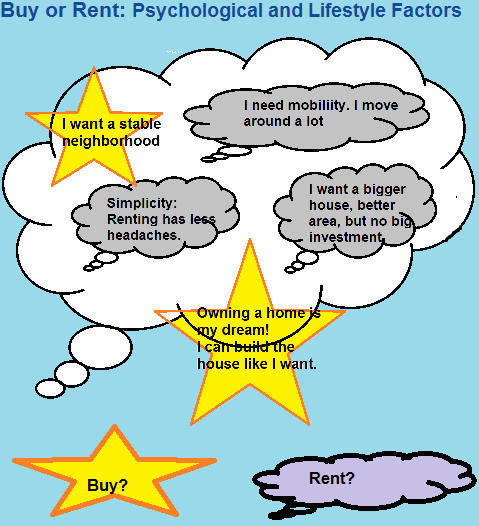Guide to Rent vs. Buy Decision
Rent vs Buy - Choosing the Right Home
Is it your dream to own a home? Or, do you desire the freedom to move around as you please? Making the decision to buy vs rent requires careful thought and planning. Your decision will depend on a number of factors including your lifestyle and your financial situation. Take the time to learn about:
- Psychological and lifestyle reasons to buy vs. rent
- Key Financial Considerations in deciding to rent vs buy
- Rent vs Buy: An Investment Decision
Buy vs Rent: Fitting Your Lifestyle
To rent or buy is not just a financial decision. Before making a decision think about which choice best fits your lifestyle and household.
Do you move around a lot and like mobility? Maybe you want more amenities (pool, gym, tennis courts) that are available for rentals. Here are some things to consider before making your decision:

Ask yourself these three questions:
- How long will I live in the house? If you plan to move soon, then a large investment is often a good reason not to buy.
- Do I want to commit a lot of resources toward housing? Buying is a commitment. That means investing an initial down payment and then investing both time and money in maintaining your home. For many, renting can be simpler.
- Which option is best for my family and living style? Do you want to be in a particular neighborhood? Are schools important in your decision? Do you want to avoid commuting to work? Buying a home can help you create roots in a local community; however, renting may be easier if you want to be close to work.
Key Financial Considerations in Deciding to Rent vs. Buy
If you decided to rent, then you really don’t have to read on. However, anyone who decides to buy will need to consider the financial aspects of their decision.
Buying a home is a large investment. Since most of us don’t have the cash to purchase our home we have to save for a down-payment and then look to qualify for a mortgage loan.
Prices vary over time and between geographical regions. That means that there is no universally correct decision. To help you make the rent or buy decision, consider these factors:
Budgeting and Making the Decision to Buy vs. Rent
Here is a list of some factors to consider:
Down-payment: The amount of money that you have saved up will be a strong factor in determining how much house you can buy. Make sure that your savings plans include a rainy day fund, retirement funds, and investment funds — some of which are earmarked toward your down-payment.
Monthly Income and Expenses: Affordability is a keyword in home buying. Keep tabs on your monthly cash-flow including your monthly expenses and debt payments. Compare monthly buying costs and renting costs:
- Your monthly expenses as a buyer include your mortgage payments (principal and interest), property taxes, homeowners insurance, and in some cases mortgage insurance and HOA fees. Don’t forget to figure in renovation and maintenance fees. A home depreciates in time and needs constant care and maintenance.
- Renting expenses include paying your rent, initial deposit, and sometimes renters insurance.
Fitting housing into your overall budget: Not only do you need to make your monthly housing expenses, but you also have to maintain all of your regular household and debt payments (student loans, auto loans, credit cards). Mortgage payments are not flexible and moving is expensive — you might lose part or all of your initial investment. Make sure that you have correctly budgeted and not overextended yourself on your purchase. Although lenders have varying criteria a good rule of thumb is that no more than 25% of your income should be budgeted for your housing expenses.
Affordable Housing - Build Credit and Get Best Mortgage Rates
Find a home you can afford. Don’t max-out your spending. Instead, build up your equity and then trade-up. If possible take a shorter-term mortgage — 15 instead of 30 years. Take time to build your credit and ensure you will qualify for the best mortgage rates.
Renting or Buying — An Investment Decision
Some people ask if renting vs buying is a good long-term investment. Like any investment, only hindsight has perfect vision. However, you will need to consider various economic and investment factors such as:
- Interest Rates: How much can you make on your money and how much will you pay on your mortgage.
- Appreciation/Depreciation of housing prices: Housing prices dropped sharply in 2006 and only in 2011 did they start to increase.
- Appreciation/Depreciation of rental prices: Just as housing prices are hard (impossible) to predict, so are rental prices.
- Tax Rates: Some expenses (mortgage insurance, property taxes) may be tax deductible. Also, capital gains and limits can affect your investment.
- Inflation: If you want to check the real rate of return, then you will need to guess inflation rates.
- One time costs: Brokers fees and other one-time costs can be very large when buying and selling a home.
- Time Horizon: The amount of time you plan to hold on to the house is a huge factor in deciding whether to buy or rent. In general, due to heavy upfront costs, buying involves a long-term investment.
Rent or Buy Calculator - the New York Times sophisticated (complex) calculator
There are a number of tools to help you make the rent or buy decision. One sophisticated model is the The New York Times Rent or Buy Calculator. You can plug in your information (rent, home price, down payment, mortgage rate, and annual property tax). You can also input a large number of advanced settings that deal with the above monthly expenses and investment decisions. The calculator will help you see when you break-even and when it is better to either buy or rent. However, the calculator’s results are very much dependent on your guessing what will to happen to property values (and rental prices) in the future. Take any result with a grain of salt.
Bills Action Plan - Review Three Factors to Help Decide if You Should Rent or Buy
Three tips to help you make your rent or buy decision:
- Lifestyle: Think about your lifestyle and whether you are prepared to make the long-term investment in buying. Check out home prices through an online site, like Trulia or Zillow, Remember, owning a home requires additional expenses, so don’t just compare a mortgage payment to your rent payment.
- Plan your budget: Take a close look at your regular expenses associated with renting and buying. Can you afford to buy? Maybe you will have to compare a nicer rental over a smaller house. Make sure that your monthly income is sufficient to cover your monthly household and debt payments. Lenders have debt- to-income rules. Make sure you qualify for a mortgage.
- Check the numbers: If worry about your long-term investments, then plug the numbers into a rent vs buy calculator. Use your best guesstimate about possible changes in housing and rental prices, the interest rate on returns, tax rates, inflation rates, and one-time transaction fees.
Thinking of Buying a Home?
Before you buy a home it is a good idea to get pre-approved. Get in touch with a mortgage lender and Get a mortgage quote from a Bills.com mortgage provider.
